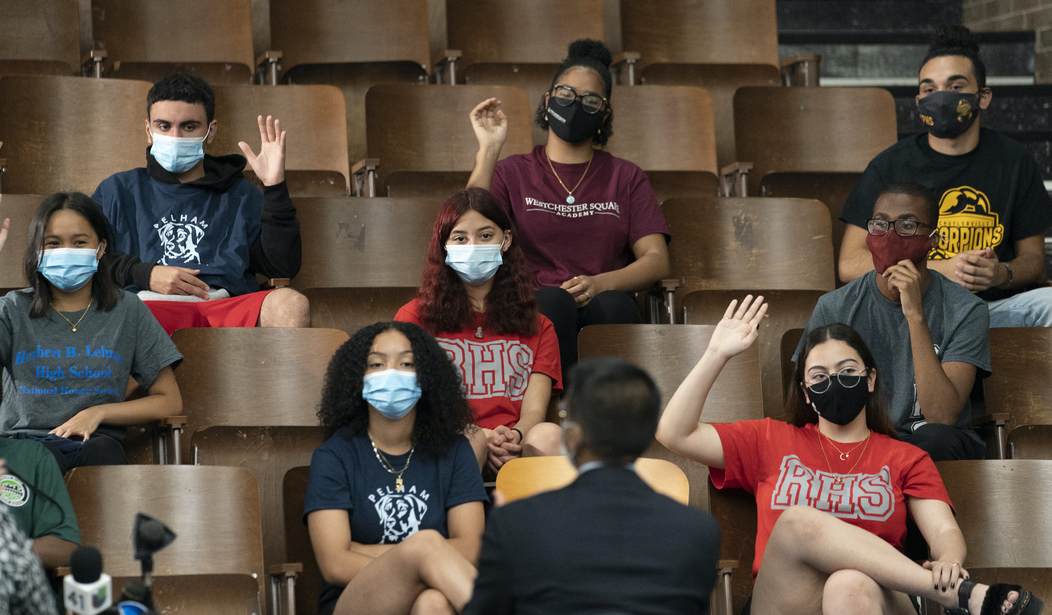According to the Biden administration, we can’t have a diverse meritocracy. The Education and Justice Departments offered universities a cheatbook on how to side-skirt our nation’s most consequential institution in the name of diversity on August 14.
The administration released a document titled, “Question and Answers Regarding the Supreme Court’s Decision in Students for Fair Admissions, Inc. v. Harvard College and University of North Carolina.” It encourages universities to collect student demographic data and ask about race in essays as long as “the racial demographics of the applicant pool do not influence admissions decisions.”
“We cannot afford that kind of backpedaling on a national scale,” said Education Department Miguel Cardona, referring to the Supreme Court decision that outlawed race-based admissions. He couldn’t be more wrong.
Why do we have to sacrifice merit-based admissions for inclusive school communities?
We don’t. I know we don’t because I’m a first-generation black American who attended a diverse, merit-based high school.
Brooklyn Tech is one of the eight specialized high schools for high-performing students in New York City. If you attend, the world is your oyster—as it was for novelists like Robert Anton Wilson, scientists like Arno Allan Penzias and other notable individuals displayed on the first floor’s Alumni Hall of Fame. The only catch? You must overcome the Specialized High Schools Admissions Test (SHSAT). As my middle school career approached dusk, I qualified for free SHSAT prep because of my high grades and low income—not the color of my skin.
During the program, I watched my friends enjoy their vacation while I studied diligently. During the school year, I had ten hours of daily instruction—eight from my charter school and two from my free tutoring program—during the weeks leading up to the life-changing exam.
Recommended
The prestigious Brooklyn Tech only admitted 8% of applicants that year. I was one of them.
That first day, anxiety loomed over me. I came from a middle school with a black student population of over 95 percent. At the time, I believed that I was different because out of 6,000 kids I couldn’t find many others who looked like me.
I was wrong. Students came from different backgrounds—Bengali, Chinese, Russian, Dominican, and Egyptian—but all of our parents immigrated to the United States. Our mothers yelled at us in different languages. Still, they scolded us about the same things: homework, late attendance, and staying out past curfew. Our families immigrated from different corners of the earth, but none of us had two pennies to rub together. Two-quarters of us ate free or reduced lunch, making our school rank 1st out of 1,339 ranked schools in New York for total students on lunch assistance.
Self-aggrandizing progressives are puzzled why I, a black American, would not support affirmative action. But why would I? My time at Brooklyn Tech felt inclusive because I bonded with students over our unique experiences being first-generation Bengali, Russian, or—in my case—Haitian American. That’s true diversity.
Liberals cite Brooklyn Tech’s sizeable Asian population (59.2%) as the reason to scrap the meritocratic SHSAT for more racially equitable methods. Suppose race-based admissions are the antidote to white supremacy in education. Why is only a fifth of students in Brooklyn Tech white? Are my Russian friends oppressors? Their parents escaped oppression, and their culture contributed to the enriching environment at Tech.
I marveled at the weird lunches they brought (yes, your Beef Tongue is strange to me) and learned their language (only the curse words because your language is difficult to learn). I spent my entire life in Brooklyn but never visited Sheepshead Bay until my friends brought me to Tashkent, a cultural supermarket littered with the infamous Russian grandmother.
Brooklyn Tech developed me into a culturally knowledgeable citizen without affirmative action. And it didn’t sacrifice its academic rigor either: I earned dozens of college credits, joined the public forum debate team, and became a published writer.
Affirmative action is unnecessary, and most Americans agree with me. According to a Reuters and Ipsos poll, 62% of Americans believe race should not be a factor in college and university admissions. Pew Research confirmed that 68% of Hispanics, 63% of Asian Americans, and 59% of Black Americans think the same.
Americans would rather have more Brooklyn Technical High Schools in our country: elite colorblind academic institutions that welcome brilliant talent from all backgrounds and income levels.
Yet, bureaucrats like Miguel Cardona are trying to end the Brooklyn Tech miracle. They despise my high school because it shines a light on their failure. According to the National Assessment of Educational Progress (NAEP), only 37% of 12th-graders could read or perform math at a college-ready level. Many of these low-performing students attend inner-city schools. So instead, they accuse meritocratic schools of racism and insist we discard merit-based admissions.
But we don’t have to. Conservatives shrivel their noses when they hear diversity, and liberals roll their eyes when they hear meritocracy. But, Brooklyn Tech is not only an example of public school done right. It is an optimistic sign of our nation’s potential if we stop compromising because we must take a side.
Daniel Idfresne is a 19-year-old political commentator and student at Syracuse University. He has written for the New York Post, Newsweek, Fox News, and The Free Press and appeared on Fox and Friends and America Reports.

























Join the conversation as a VIP Member